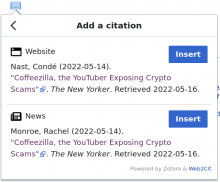List of steps to reproduce (step by step, including full links if applicable):
- Open visual editor (should be no different in other editors that support Citoid but I tested Visual)
- Use Citoid to insert https://www.tatler.com/article/clodagh-mckenna-hon-harry-herbert-wedding-george-osborne-highclere-castle
- or https://www.teenvogue.com/story/camila-cabello-scar-tissue-story
What happens?:
https://en.wikipedia.org/w/index.php?title=&diff=prev&oldid=1058626070
Condé Nast is a global mass media company, not a person.
What should have happened instead?:
Insert "Annabel Sampson" for the Tatler article and "Brianna Wiest" for the Teen Vogue article.
